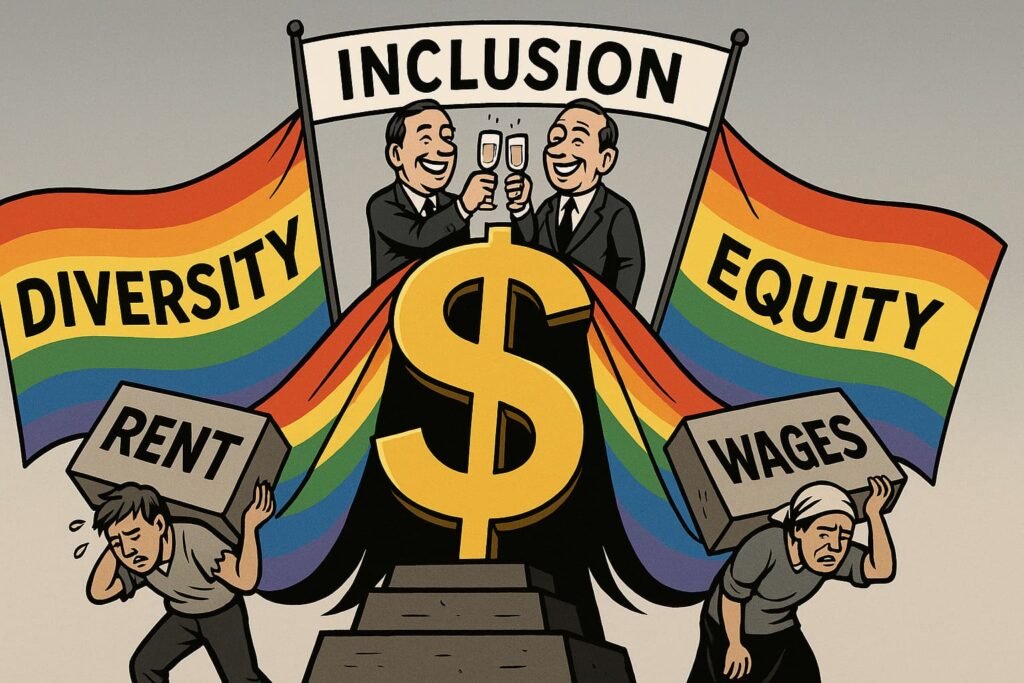How Identity Politics Became Capitalism’s Best Friend – Opinion
Here’s the irony no one admits: the Left thought identity politics would challenge the system. Instead, it handed capitalism a rainbow flag and a DEI checklist — and the system never looked safer.
Table of contents
From Class to Culture
When the Berlin Wall fell, the socialist dream collapsed with it. The working class didn’t want revolution; they wanted consumer goods, mortgages, and a holiday in Spain. The Left, suddenly homeless, needed a new battlefield.
Enter identity politics. Race, gender, and sexuality replaced class. Economic struggle was out; cultural grievances were in.
A Stealth Infiltration
Class politics scared capitalism — it demanded redistribution, higher wages, real sacrifice from the top.
Identity politics? Much easier. It asked for recognition, representation, and symbolic gestures. No threat to profit margins, no revolution required.
So while the rhetoric screamed “justice,” the system barely had to move.
How Capitalism Adapted
Capitalism is nothing if not opportunistic. It took identity politics and turned it into a product.
- Pride logos every June.
- Diversity pledges in HR manuals.
- “Inclusive” ad campaigns with diverse models.
All the moral glow, none of the economic cost. Woke capitalism was born.
Merit Kicked to the Curb
In the process, capitalism’s old selling points — freedom, individualism, meritocracy — were rewritten.
- Freedom became the right to assert your identity.
- Individual success was recast as systemic privilege.
- Meritocracy? Declared a cover for oppression.
The focus shifted from the individual to the group. And corporations, always keen to avoid paying more wages, were thrilled to play along.
The Forgotten Class
Meanwhile, the actual economic problems didn’t vanish:
- Wages stagnated.
- Housing costs exploded.
- Inequality widened.
But these weren’t fashionable struggles anymore. Why talk about pay when you can talk about pronouns?
The Faustian Bargain
The Left stayed culturally relevant by swapping class for identity. Capitalism stayed economically untouchable by adopting the language of “inclusion.”
Everyone got what they wanted — except workers, citizens, and anyone still waiting for economic fairness.
Conclusion
Identity politics didn’t slay capitalism. It became its best friend. What was once a revolutionary critique has been reduced to marketing slogans, safe HR policies, and rainbow-washed logos.
The real fight — over wealth, power, and who actually benefits — got quietly shelved. And capitalism? It’s never looked healthier.
Cross-Link Notes
- Identity Politics Explained – Division Disguised as Justice
- Woke Capitalism Explained – When Morality Meets Marketing
FAQ
Did identity politics really replace class politics?
Yes. After the Cold War, leftist movements pivoted from focusing on workers and wages to cultural identity. Race, gender, and sexuality became the new battlegrounds.
Why is identity politics easier for capitalism to absorb?
Because it doesn’t demand redistribution of wealth. Recognition, representation, and slogans are cheap compared to higher wages or economic reform.
What is “woke capitalism”?
When corporations adopt social justice language — rainbow logos, DEI pledges, activist ads — not out of conviction, but because it’s profitable branding.
How did meritocracy get devalued?
Merit, once seen as fair competition, is reframed as systemic privilege. Group identity now outweighs individual achievement.
Who benefits from identity politics?
Politicians gain loyal blocs, corporations polish their brands, and NGOs raise endless funds. Ordinary workers? Still waiting for fairer wages and lower housing costs.
What’s the danger of identity politics for democracy?
It divides people into tribes, distracts from economic injustice, and lets elites — both political and corporate — keep the system exactly as it is.



